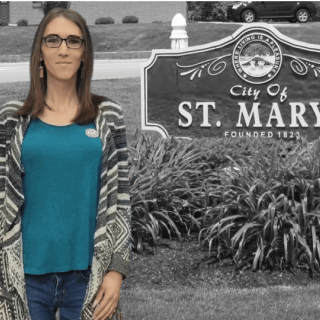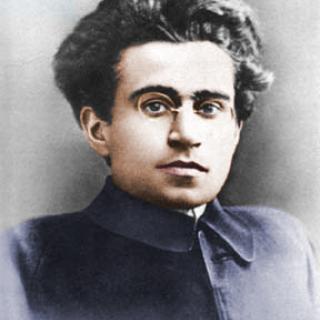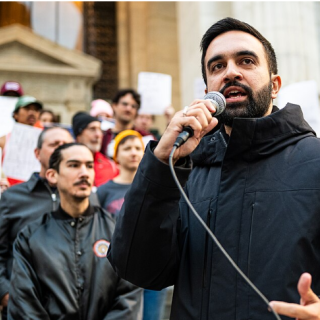This past weekend in the brisk sunshine, a volunteer representing Adrienne Hood for Columbus City Council knocked on the front door of a registered voter on Karl Road in the new District 4, which encompasses much of the northside. As traffic raced in both directions, someone finally opened the door.
The volunteer was seeking signatures to qualify Hood as a candidate for City Council’s primary vote this coming May – the first election ever for City Council’s new nine district system, that was approved by voters in 2018. The general election is November, and in 2024, a councilmember will represent each of the nine districts increasing the current number of Councilmembers by two.
Hood’s volunteer asks the voter, “Do you remember who Adrienne Hood’s son was? He was shot and killed by Columbus police.”
As if a lightbulb flickered, the registered voter swings open the storm door into the freezing wind and reaches for the clip board and pen. The cold has congealed the pen’s ink, so they press harder to make sure their signature counts. The Free Press has heard from several potential candidates they need to collect double the required amount since the Franklin County Board of Elections invalidates approximately 50 percent of signatures submitted.
No doubt there is enthusiasm in District 4 for a candidate such as Adrienne Hood. But whether it be voter apathy or the City’s inability to reach and teach its own residents – which some argue is deliberate – many voters are in the clouds about how the new system works.
For instance, there may or may not be a primary for many of the nine districts as three candidates are needed to trigger a primary. The deadline to qualify with 250 valid signatures is February 1st. If there two candidates for each district, then there will be 18 candidates for City Council on the ballot in November.
But for those local progressive activists who have been following the arrival of the district system, they’re shaking their heads in disgust. Because the primary vote itself is not intra-district only. It’s citywide. November’s general election will also be citywide. And those candidates not on any Franklin County Democratic sample ballot, whether for the primary or the general election, are unlikely to win over any endorsed candidate.
“This is fake district representation. Every voter gets to vote in all nine district elections. It doesn’t matter if you win your district, you have to win the citywide vote. In the primary and the general election,” said Columbus mayoral candidate Joe Motil.
Hood resides in District 4, and has for many years, as it is a requirement for candidacy. Each district has roughly 100,000 residents, and District 4 includes Forest Park, Clintonville, North and South Linden, and also the street where her son, Henry Green, perished. There’s an incumbent in District 4, Emmanuel Remy, who’s been on City Council since 2018. Hood also found out this week a third candidate began gathering signatures so a primary vote for District 4 is likely.
“In my personal opinion the challenge is the sample ballot,” said Hood, a retired veteran, to the Free Press. “That is something that goes out all around Columbus. And a lot of people don’t take into consideration getting to know who is actually running.”
She continued, “It is what it is. I have been using my voice since I was thrust into this space involuntarily [after the death of her son]. And I am not going anywhere.”
District 4 is a majority-Black district with 46 percent African American and 33 percent white. Activist Jonathan Beard says Hood is an inspiration for Columbus – not just the majority Black neighborhoods she seeks to represent.
“She will be running against an entrenched incumbent [Remy] who in his first council meeting voted to support this voting method that is problematic under the Voting Rights Act because it dilutes the votes of minority communities to the white plurality,” said Beard. “And Councilmember Remy will have party support and unlimited funding from corporate Columbus funneled through the Council President [Shannon Hardin] who proposed this unfair and possibly unlawful at-large election method – which is a reflection of the corruption of our local democracy. In a fair democracy where character and competence and an ability to represent all people mattered, Ms. Hood would run away with the victory in a landslide.”
There will be several new faces on City Council in 2024, that’s a given.
“Guaranteed, whoever runs in Districts 1, 2 and 6 will be new fresh faces on council, those seats are all open,” said Nancy Day-Achauer to the Free Press, who is seeking candidacy in District 2, which includes many far west neighborhoods.
A registered Democrat, Day-Achauer, also the pastor at both Parkview and Westgate United Methodist Churches, was endorsed by Democrats when she ran for the Ohio House of Representatives (District 23) in 2020, but she lost.
Day-Achauer says the far westside past I-270 lacks representation and she believes a District 2 councilmember will help. For example, there’s been a longtime need for a rec center with after-school programs, but nothing has come of the community’s pleas for such a rec center.
“My inspiration for running is seeking equity for the westside,” she says. “Those who live out in the far westside of Columbus are not being engaged. You have to be engaging residents in a city this big.”
Day-Achauer, a former member of the Westland Area Commission and current member of the Prairie Township Community Health Action Team, is firmly in the camp supporting the district system.
“These districts are not ‘fake’,” she says. “They were created in response to citizens saying they wanted local representation on council. I attended charter amendment committee meetings several years ago and also attended districting committee meetings. The committees had a difficult job and were conscientious about their work. Some people prefer a ward system where only people who live in the ward vote for the candidate in their ward and the council member is accountable to only them. I prefer an at-large election because I believe that council members should be answerable to every resident of Columbus, not just the people in their district. There are positives and negatives to both systems.”
To have true district representation, says Motil, voters should only be allowed to vote in their district or ward.
“The Franklin County Democrats will endorse nine candidates on the citywide ballot (in November) and it gives them a hell of an advantage,” said Motil.



